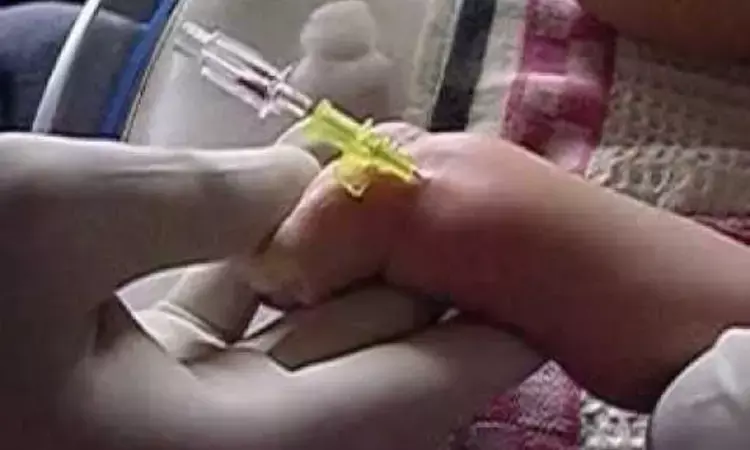- Home
- Medical news & Guidelines
- Anesthesiology
- Cardiology and CTVS
- Critical Care
- Dentistry
- Dermatology
- Diabetes and Endocrinology
- ENT
- Gastroenterology
- Medicine
- Nephrology
- Neurology
- Obstretics-Gynaecology
- Oncology
- Ophthalmology
- Orthopaedics
- Pediatrics-Neonatology
- Psychiatry
- Pulmonology
- Radiology
- Surgery
- Urology
- Laboratory Medicine
- Diet
- Nursing
- Paramedical
- Physiotherapy
- Health news
- Fact Check
- Bone Health Fact Check
- Brain Health Fact Check
- Cancer Related Fact Check
- Child Care Fact Check
- Dental and oral health fact check
- Diabetes and metabolic health fact check
- Diet and Nutrition Fact Check
- Eye and ENT Care Fact Check
- Fitness fact check
- Gut health fact check
- Heart health fact check
- Kidney health fact check
- Medical education fact check
- Men's health fact check
- Respiratory fact check
- Skin and hair care fact check
- Vaccine and Immunization fact check
- Women's health fact check
- AYUSH
- State News
- Andaman and Nicobar Islands
- Andhra Pradesh
- Arunachal Pradesh
- Assam
- Bihar
- Chandigarh
- Chattisgarh
- Dadra and Nagar Haveli
- Daman and Diu
- Delhi
- Goa
- Gujarat
- Haryana
- Himachal Pradesh
- Jammu & Kashmir
- Jharkhand
- Karnataka
- Kerala
- Ladakh
- Lakshadweep
- Madhya Pradesh
- Maharashtra
- Manipur
- Meghalaya
- Mizoram
- Nagaland
- Odisha
- Puducherry
- Punjab
- Rajasthan
- Sikkim
- Tamil Nadu
- Telangana
- Tripura
- Uttar Pradesh
- Uttrakhand
- West Bengal
- Medical Education
- Industry
Smart glasses improve success of radial arterial catheterization in small children: Study

Korea: A recent study in the journal Anesthesiology has reported that the use of smart glasses could improve the first-attempt success rate and ergonomic satisfaction in ultrasound-guided radial arterial catheterization in small pediatric patients. It also reduced the first-attempt procedure time and overall complication rates.
The success of delicate ultrasound-guided medical procedures is largely determined by hand-eye coordination and ergonomics. This can be improved by using smart glasses (head-mounted displays) which decrease the head movement on the ultrasound screen. In pediatric patients with small body sizes, there is a limited space allowed for the anesthetic procedure, and the position and posture of the operator must be adjusted accordingly.
Against the above background, Jin-Tae Kim, Seoul National University College of Medicine, Seoul, Republic of Korea, and colleagues hypothesized that smart glasses could improve the success rate of ultrasound-guided pediatric radial arterial catheterization.
To test their hypothesis, they designed a prospective, single-blinded, randomized controlled, single-center study enrolling 116 pediatric patients (age less than 2 yr) requiring radial artery cannulation during general anesthesia. They were randomized into the ultrasound screen group (control) or the smart glasses group. Following induction of general anesthesia, ultrasound-guided radial artery catheterization was performed.
The primary outcome was the first-attempt success rate. The secondary outcomes included the first-attempt procedure time, the overall complication rate, and operators' ergonomic satisfaction (5-point scale).
Based on the study, the researchers found the following:
- The smart glasses group had a higher first-attempt success rate than the control group (87.9% vs. 72.4%; odds ratio, 2.78; absolute risk reduction, –15.5%).
- The smart glasses group had a shorter first-attempt procedure time (median, 33 s; interquartile range, 23 to 47 s; range, 10 to 141 s) than the control group (median, 43 s; interquartile range, 31 to 67 s; range, 17 to 248 s).
- The overall complication rate was lower in the smart glasses group than in the control group (5.2% vs. 29.3%; odds ratio, 0.132; absolute risk reduction, 24.1%).
- The proportion of positive ergonomic satisfaction (4 = good or 5 = best) was higher in the smart glasses group than in the control group (65.5% vs. 20.7% [12/58]; odds ratio, 7.3; absolute risk reduction, –44.8%).
The researchers concluded, "smart glasses during radial artery cannulation improve the first-attempt success rate and ergonomic satisfaction and lower procedure time, the number of attempts, and procedure-related complications in pediatric patients aged less than 2 yr."
Reference:
Young-Eun Jang, Sung-Ae Cho, Sang-Hwan Ji, Eun-Hee Kim, Ji-Hyun Lee, Hee-Soo Kim, Jin-Tae Kim; Smart Glasses for Radial Arterial Catheterization in Pediatric Patients: A Randomized Clinical Trial. Anesthesiology 2021; 135:612–620 doi: https://doi.org/10.1097/ALN.0000000000003914
Dr Kamal Kant Kohli-MBBS, DTCD- a chest specialist with more than 30 years of practice and a flair for writing clinical articles, Dr Kamal Kant Kohli joined Medical Dialogues as a Chief Editor of Medical News. Besides writing articles, as an editor, he proofreads and verifies all the medical content published on Medical Dialogues including those coming from journals, studies,medical conferences,guidelines etc. Email: drkohli@medicaldialogues.in. Contact no. 011-43720751


